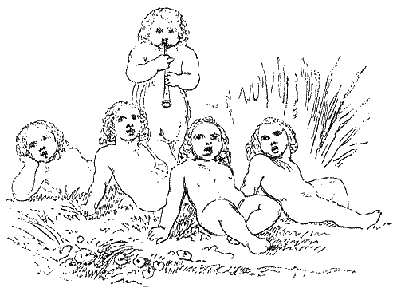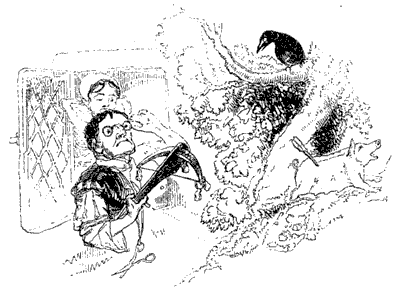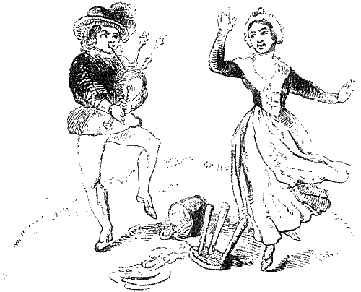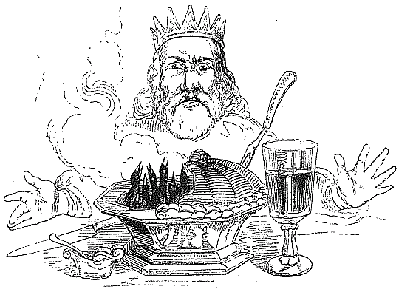
SIXTH CLASS—SONGS.

SIXTH CLASS—SONGS.
| [This is the version generally given in nursery collections, but is somewhat different in the 'Pills to Purge Melancholy,' 1719, vol.iv, p.148.] |
|
ONE misty moisty morning When cloudy was the weather, There I met an old man Clothed all in leather ; Clothed all in leather, With cap under his chin,— How do you do, and how do you do, And how do you do again !
|
/ p.50 /
|
THERE was a man in our toone, in our toone, in our toone, There was a man in our toone, and his name was Billy Pod ; And he played upon an old razor, an old razor, an old razor, And he played upon an old razor, with my fiddle fiddle fe fum fo.
And his hat it was made of the good roast beef,
And his coat it was made of the good fat tripe,
And his breeks were made of the bawbie baps, |
|
And there was a man in tither toone, in tither toone, in tither toone, And there was a man in tither toone, and his name was Edrin Drum ; And he played upon an old laadle, an old laadle, an old laadle, And he played upon an old laadle, with my fiddle fiddle fe fum fo.
And he eat up all the good roast beef, the good
|
|
JOHN COOK had a little grey mare ; he, haw, hum ! Her back stood up, and her bones they were bare ; he, haw, hum !
John Cook was riding up Shuter's bank ; he, haw, hum ! |
|
John Cook was riding up Shuter's hill ; he haw, hum ! His mare fell down, and she made her will ; he, haw, hum !
The bridle and saddle were laid on the shelf ; he, haw, hum !
|
|
A CARRION crow sat on an oak, Fol de riddle, lol de riddle, hi ding do, Watching a tailor shape his cloak ; Sing heigh ho, the carrion crow, Fol de riddle, lol de riddle, hi ding do
Wife, bring me my old bent bow,
The tailor he shot and missed his mark, |
|
Wife, bring brandy in a spoon ; Fol de riddle, lol de riddle, hi ding do, For our old sow is in a swoon, Sing heigh ho, the carrion crow, Fol de riddle, lol de riddle, hi ding do. |

|
|
|
HIC hoc, the carrion crow, For I have shot something too low : I have quite missed my mark, And shot the poor sow to the heart ; Wife, bring treacle in a spoon, Or else the poor sow's heart will down.
|
/ p.54 /
| [The original of the following is to be found in 'Deuteromelia, or the second part of Músicks Melodie,' 4to, Lond. 1609, where the music is also given.] |
|
THREE blind mice, see how they run ! They all ran after the farmer's wife, Who cut off their tails with the carving-knife, Did you ever see such fools in your life ? Three blind mice.
|
| [The music to the following song, with different words, is given in 'Melismata,' 4to, Lond. 1611. See also the 'Pills to Purge Melancholy,' 1719, vol. i, p.14. The well-known song, 'A frog he would a wooing go,' appears to have been borrowed from this. See Dauney's 'Ancient Scottish melodies,' 1838, p.53. The story is of old date, and in 1580 there was licensed 'A most strange weddinge of the frogge and the mouse,' as appears from the books of the Stationers' Company, quoted in Warton's Hist. Engl. Poet., ed. 1840, vol.iii, p.360.] |
|
THERE
was a frog liv'd in a well, Kitty alone, Kitty alone, There was a frog liv'd in a well, Kitty alone, and I. There was a frog liv'd in a well, And a farce* mouse in a mill, [*merry. Cock me cary, Kitty alone, Kitty alone and I.
This frog he would a wooing ride, |
|
He rode till he came to my Lady Mouse hall, Kitty alone, &c. He rode till he came to my Lady Mouse hall, And there he did both knock and call, Cock me cary, &c.
Quoth he, Miss Mouse, I'm come to thee,
Quoth she, answer I'll give you none,
And when her uncle Rat came home,
Sir, there's been a worthy gentleman, |
|
The frog he came whistling through the brook, Kitty alone, &c. The frog he came whistling through the brook, And there he met with a dainty duck, Cock me cary, &c.
This duck she swallow'd him up with a pluck,
|
|
|
|
AWA'
birds, away ! Take a little, and leave a little, And do not come again ; For if you do, I will shoot you through, And there is an end of you.
|
|
IF I'd as much money as I could spend, I never would cry old chairs to mend ; Old chairs to mend, old chairs to mend ; I never would cry old chairs to mend.
If I'd as much money as I could tell,
|
/ p.57 /
| [A song of the fifteenth century, somewhat similar to the following, is printed in the 'Reliquiæ Antiquæ,' vol. i, p. 4, from a MS. at Cambridge.] |
|
THE
fox and his wife they had a great strife, They never eat mustard in all their whole life; They eat their meat without fork or knife, And loved to be picking a bone, e-oh !
The fox jumped up on a moonlight night ;
The fox when he came to yonder stile,
The fox when he came to the farmer's gate,
The gray goose she ran round the hay-stack, |
|
The farmer's wife she jump'd out of bed, And out of the window she popped her head : Oh, husband ! oh, husband ! the geese are all dead, For the fox has been through the town, e-oh !
The farmer he loaded his pistol with lead,
|
|
I'LL sing you a song : The days are long, The woodcock and the sparrow : The little dog has burnt his tail, And he must be hanged to-morrow.
|
|
|
|
SAYS
t'auld man tit oak tree, Young and lusty was I when I kenn'd thee ; I was young and lusty, I was fair and clear, Young and lusty was I mony a lang year; But sair fail'd am I, sair fail'd now, Sair fail'd am I sen I kenn'd thou.
|
/ p.59 /
| [The following lines are part of an old song, the whole of which may be found in 'Deuteromelia,' 1609, and also in MS. Additional, 5336, fol. 5.] |
|
OF all the gay birds that e'er I did see, The owl is the fairest by far to me ; For all the day long she sits on a tree, And when the night comes away flies she.
|
|
I LOVE sixpence, pretty little sixpence, I love sixpence better than my life ; I spent a penny of it, I spent another, And took fourpence home to my wife.
Oh, my little fourpence, pretty little fourpence,
Oh, my little twopence, my pretty little twopence,
Oh, my little nothing, my pretty little nothing,
|
/ p.60 /
|
|
|
TOM he was a piper's son, He learn'd to play when he was young, But all the tunes that he could play, Was "Over the hills and far away ;" Over the hills, and a great way off, And the wind will blow my top-knot off.
Now Tom with his pipe made such a noise,
Tom with his pipe did play with such skill,
As Dolly was milking her cow one day, |
|
He met old dame Trot with a basket of eggs, He used his pipe and she used her legs ; She danced about till the eggs were all broke, She began for to fret, but he laughed at the joke.
He saw a cross fellow was beating an ass,
|

/ p.62 /
|
AS I was going up the hill, I met with Jack the piper, And all the tunes that he could play Was "Tie up your petticoats tighter."
I tied them once, I tied them twice,
|
|
THERE were two birds sat on a stone, Fa, la, la, la, lal, de ; One flew away, and then there was one, Fa, la, la, la, lal, de ; The other flew after, and then there was none, Fa, la, la, la, lal, de ; And so the poor stone was left all alone, Fa, la, la, la, lal, de !
|
|
AS I was going along, long, long, A singing a comical song, song, song, The lane that I went was so long, long, long, And the song that I sung was as long, long, long, And so I went singing along.
|
/ p.63 /
|
LONDON bridge is broken down, Dance o'er my lady lee ; London bridge is broken down, With a gay lady.
How shall we build it up again ?
Silver and gold will be stole away,
Build it up again with iron and steel,
Iron and steel will bend and bow,
Build it up with wood and clay, |
|
Wood and clay will wash away, Dance o'er my lady lee ; Wood and clay will wash away, With a gay lady.
Build it up with stone so strong,
|
|
THE north wind doth blow, And we shall have snow, And what will poor Robin do then ? Poor thing ! He'll sit in a barn, And to keep himself warm, Will hide his head under his wing. Poor thing ! |
|
|
|
THE white dove sat on the castle wall, I bend my bow and shoot her I shall ; I put her in my glove both feathers and all ; I laid my bridle upon the shelf, If you will any more, sing it yourself.
|
/ p.65 /
|
WOOLEY FOSTER has gone to sea, With silver buckles at his knee, When he comes back he'll marry me, Bonny Wooley Foster.
Wooley Foster has a cow,
Wooley Foster has a hen,
|
|
|
|
BUZ, quoth the blue fly, Hum, quoth the bee, Buz and hum they cry, And so do we : In his ear, in his nose, Thus, do you see ? He ate the dormouse, Else it was he. |
/ p.66 /
|
JOHNNY shall have a new bonnet, And Johnny shall go to the fair, And Johnny shall have a blue ribbon To tie up his bonny brown hair. And why may not I love Johnny ? And why may not Johnny love me ? And why may not I love Johnny, As well as another body ? And here's a leg for a stocking, And here is a leg for a shoe, And he has a kiss for his daddy, And two for his mammy, I trow. And why may not I love Johnny ? And why may not Johnny love me ? And why may not I love Johnny, As well as another body ?
|
|
AS I was walking o'er little Moorfields, I saw St. Paul's a running on wheels, With a fee, fo, fum. Then for further frolics I'll go to France, While Jack shall sing and his wife shall dance, With a fee, fo, fum.
|
/ p.67 /
|
TRIP upon trenchers, and dance upon dishes, My mother sent me for some barm, some barm ; She bid me tread lightly, and come again quickly, For fear the young men should do me some harm. Yet didn't you see, yet didn't you see, What naughty tricks they put upon me : They broke my pitcher, And spilt the water, And huff'd my mother, And chid her daughter, And kiss'd my sister instead of me.
|
|
|
|
SOME up, and some down, There's players in the town, You wot well who they be ; The sun doth arise, To three companies, One, two, three, four, make wee !
Besides we that travel,
|
/ p.68 /
| [Douce, in his MS. Additions to Ritson's 'Grammer Gurton's Garland,' gives one version of the following song, in which Jack Straw is introduced in the chorus.] |
|
MY father he died, but I can't tell you how, He left me six horses to drive in my plough : With my wing wang waddle oh, Jack sing saddle oh, Blowsey boys bubble oh, Under the broom.
I sold my six horses and I bought me a cow,
I sold my cow, and I bought me a calf ;
I sold my calf, and I bought me a cat ;
I sold my cat, and bought me a mouse ; |
/ p.69 /
|
LITTLE Bo-peep has lost her sheep, And can't tell where to find them ; Leave them alone, and they'll come home, And bring their tails behind them.
Little Bo-peep fell fast asleep,
Then up she took her little crook,
It happen'd one day, as Bo-peep did stray,
She heav'd a sigh and wip'd her eye,
|
/ p.70 /
|
ABOUT the bush, Willy, About the bee-hive, About the bush, Willy, I'll meet thee alive.
Then to my ten shillings,
Five and five shillings,
Five and five shillings,
|
/ p.71 /

| [The first line of this nursery rhyme is quoted in Beaumont and Fletcher's 'Bonduca,' Act v, sc.2. It is probable also that Sir Toby alludes to this song in 'Twelfth Night,' Act ii, sc.2, when he says, "Come on; there is sixpence for you ; let's have a song.' In 'Epulario, or the Italian banquet,' 1589, is a receipt "to make pies so that the birds may be alive in them, and flie out when it is cut up," a mere device, live birds being introduced after the pie is made. This may be the original subject of the following song.] |
|
SING a song of sixpence, A bag full of rye ; Four and twenty blackbirds Baked in a pie ;
When the pie was open'd, |
|
The king was in his counting-house Counting out his money ; The queen was in the parlour Eating bread and honey ;
The maid was in the garden
Jenny was so mad,
|